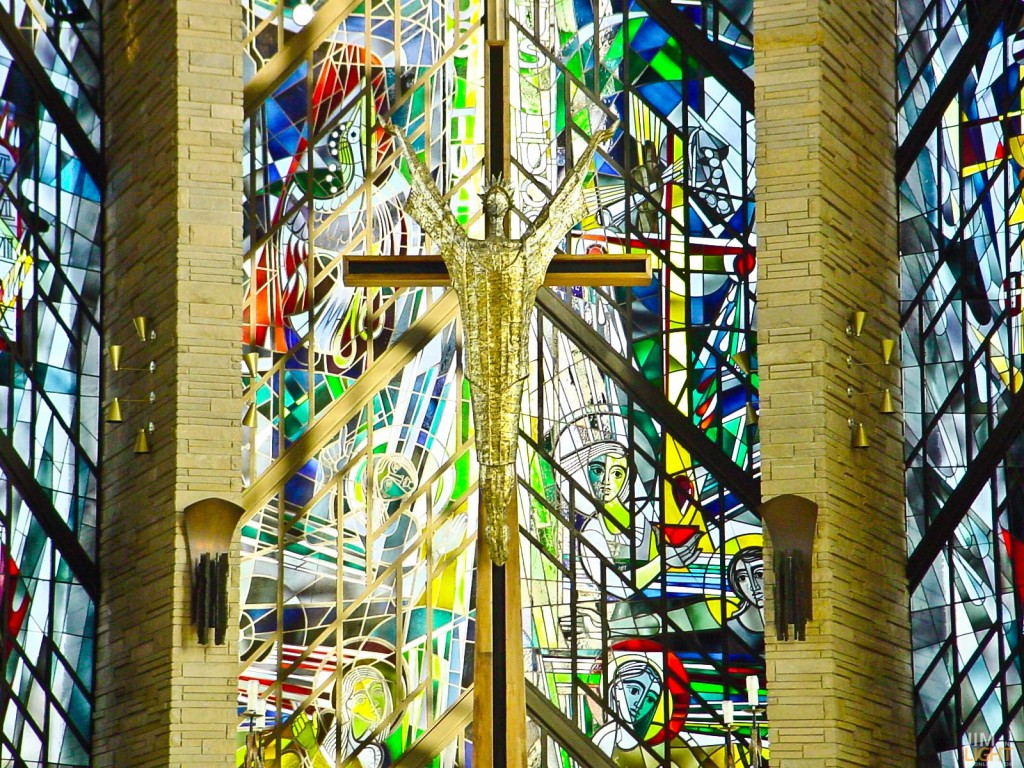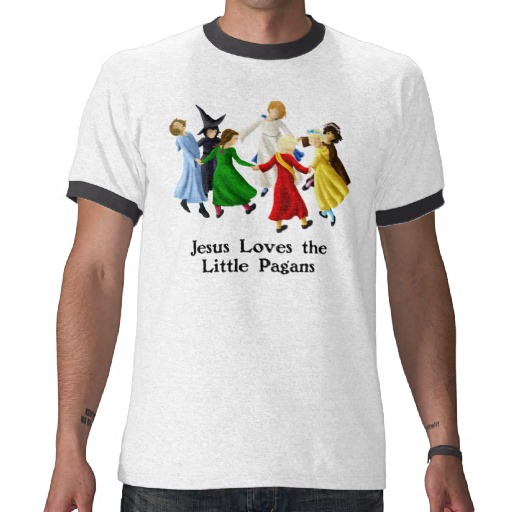
A Pagan’s First Communion
This past Easter, I attended an Easter service at the Valparaiso University Chapel of the Resurrection with some Unitarian friends. It was a gorgeous service in a stunning venue. They had a full orchestra, and the house was packed. And I actually took communion. It was a Lutheran style service with an open communion, and since technically I was baptized Christian once upon a time, I felt like I could do so without being disrespectful. In fact, it was the first time ever that I have taken communion in this way. Mormons have a communion-like service every Sunday, but it is vastly different from a high church-style (Lutheran) communion — different enough that it felt like a “first communion” for me.
I had been looking forward to this opportunity for some time. I’ve been longing for some well-executed high ritual for a while, so I had been looking for a church with a high-church liturgy and an open communion. Pagan ritual is great, but in some ways it can’t compare with the Christian institution, supported as it is by massive infrastructure, professional priesthood, a large laity, and 2000 years of repetition. So, when my friends invited me to attend the Valparaiso Easter Sunday service, it felt like providence. I took my two kids and my atheist father, too. (My wife elected to attend the LDS Church service, due to her commitment as a Sunday School teacher there.) I sang the hymns and recited the liturgy and took communion. The only part I omitted was the recitation of the Creed.
So, what did it mean for me, a Pagan, to take Christian communion? I had struggled for a while to put words to my longing, but the morning before we went to the service, I fortuitously came across a poem on my RSS feed by Elizabeth Cunningham (author of The Passion of Mary Magdalen) called “Jesus the Ground”. This poem crystallized what participating in the Easter communion meant for me:
Jesus the ground
In the Creed it says he descended into Hell,
Some call it the harrowing of Hell.I remember the summer I worked on a farm
driving the tractor, harrowing the rough-ploughed fields
dragging a big comb through the earth,
breaking up the clumps, softening it for the seeds.Some say Jesus went down and raised the righteous dead,
led them forth from the shadowy regions of Sheol.What if when he harrowed hell he became the earth,
rich and open and fertile, the ground for the grain,
for the vine, what if we literally take his body
and turn it into bread and wine.What if Jesus so loved the earth
he gave his only begotten body to the ground.
I’m not Christian. I’m not even a Christo-Pagan. (And don’t worry, I’m not going to be following in Teo Bishop‘s steps anytime soon.) But somehow, I felt perfectly genuine — if a little awkward, it being my first time and all — taking communion side by side with Christians. I’m not sure what it meant for my atheist son and atheist father, who also took communion, but for me, it felt like I was taking part of the holy earth into me, affirming my dependence on the soil in which the wheat stalk and the grape vine grow, and on the cycles of growth and decay in nature, and also celebrating the awakening of the earth in spring. (Easter this year fell almost as late as it is possible for Easter to fall, so instead of rain and cold, we actually had warm sunshine for once.) I found it a little ironic that I, a Pagan, was attending an Easter service with humanists and atheists, and my Christian wife wasn’t even with me. But ironic or not, as I knelt to take communion, it just felt right. I think I’m going to make it an annual event.
I know some Pagans will find this upsetting. In my recent post about Easter, “How James Frazer (inadvertently) saved Easter for Neo-Pagans“, I got some slack in the comments. One person wrote, “Those who truly feel no cognitive dissonance between Paganism and Christianity have not troubled to deeply engage either system of spirituality.” I don’t think I need to respond to that. Suffice it to say that some Pagans are just set off by any hint of Christo-Paganism. I am sympathetic, though, since I have a similar reaction to anything Mormon.
I really don’t have the same problem with high-church Christianity. While Mormons are Christian, in the broad sense of the term, they are very different from a lot of other Christians. I mean, the fact that this past Easter felt like my first communion really says something. Last year, I went to the Mormon church with my family on Easter, and then ran over to the Unitarian church to catch the service there. Ironically, there was more Easter at the (predominately non-Christian) Unitarian church than at the Mormon church. There was only one reference to Easter in the Mormon service, and it was the bishop making the point that every Sunday is Easter for Mormons. So attending a Lutheran Easter service this year was an unfamiliar experience for me. It was just not the kind of Christianity that is part of my pre-Pagan past, so it didn’t bring up all the baggage that it must for other Pagans who were raised with that kind of Christianity. For me, it was different enough that it could almost have been a Hindu or Buddhist ceremony.
But I have still have to fight down an almost instinctual aversion to all things Mormon. It’s been 13+ years since I left the Mormon church, and I am still trying to work out my relationship to it. If I had been single at the time, I would have left and that would have been that. But my wife was still Mormon, and until recently my son identified as Mormon. So I inevitably find my way back into a Mormon chapel from time to time.
When I first left the Mormon church, I was highly reactive. I remember one Sunday in particular, a couple of years after I had left, when I attended the main service to hear my 4 year-old son sing with the Sunday School children. The simple children’s songs set me on edge. I actually had difficulty staying in the room. If I had to put words to my feelings, I would say that the simplicity of their faith in some way felt like a denial of the complexity of problems that caused me to leave. This was no doubt amplified by fact that adult Mormons are frequently admonished by their leaders to be like little children in their faith and discouraged from exercising the critical faculties of adults. Still, I felt like an idiot. I mean, the urge to run away from Sunday School children is surely a sign of immaturity.
Since then, I’ve relaxed considerably. I can attend LDS worship services, and for the most part, I don’t feel the need to bolt. For the most part, I just find it boring (not unlike many Mormons). Still, I find myself getting irritated on occasion, though. Ironically, it is the most outwardly benign parts of the religion that irk me. I get a certain wicked satisfaction when I hear Mormons make blatantly sexist, intolerant, closed-minded, or otherwise ignorant statements, but it’s their niceness that really sets my teeth on edge. Because it is precisely the niceness (“Mormons make good neighbors”) that conceals the sexism, racism, homophobia, and the other issues that I have with Mormonism.
This weekend, my wife and I are presenting at the Kirtland, Ohio Sunstone Conference to a small gathering of liberal Mormons and members of the Community of Christ (formerly known as the Reorganized Church of Jesus Christ of Latter-day Saints). We went last year and had a great experience. Our presentation this year is entitled, “Still the One: Differentiation and Intimacy after a Spouse’s Change of Faith”. It’s about the stages we have gone through as a couple since I left the Mormon church. To be honest, we’re having trouble with the preparation. A big part of it, I think is that, we are still struggling to integrate our faiths. While my wife happily attends Pagan rituals and Unitarian services, I still can’t bring myself to attend the LDS Church on even a semi-regular basis. I was going on a monthly basis for a little while, but I found it harder and harder to keep it up. That’s probably because not all of my reasons for going were great. My primary reason was because I wanted to support my son, but he has since come out as atheist. And while I also wanted to support my wife, I think she found my presence as much a distraction as a support. (I admit this was somewhat intentional on my part.)
I’ve tried to integrate our faiths in various ways, including having a Pagan baptism to coincide with my daughter’s Mormon baptism, working Jesus explicitly into our Mid-Spring ritual, pointing out the obvious connections with Christianity in our autumn equinox and winter solstice rituals, having a Mormon-style first-day-of-school blessing ritual for the kids, and even addressing prayers to “Heavenly Father and Heavenly Mother” at meals (I’d prefer “Sky Father and Earth Mother”). But my wife tells me that she still feels like she is joining my world, but I am not joining hers, and she’s right in a way. I keep telling myself that my going to the LDS Church is different than my wife going to the Unitarian church: I have a history at the LDS Church and she comes to Paganism and Unitarianism with no history with those faiths. And while I routinely hear things at the Mormon church that (I think justifiably) trigger my anger, my wife is unlikely to hear anything she finds offensive at the Unitarian church or in a Pagan ritual. What’s more, my religious practice is flexible, while hers is not. So I can write a ritual about Jesus and the Goddess that integrates Christian and Pagan themes. And one of the first things they ask me to do at the Unitarian church was to give a presentation on Mormonism. But there is no such inclusivity or curiosity at the Mormon church.
Still, in spite of all of these justifications, lately I’ve been wondering whether I need to work on this more. Is it a sign of spiritual immaturity that I can’t sit though even the most benign Mormon worship service without squirming inwardly? Should I try again to make peace with Mormonism? If so, how do I go about it? I don’t need to become Mormon again. But can’t I just go once a month? Obviously, it would be beneficial to my relationship with my wife if I were less ambivalent about participating in Mormonism. But I wonder, might it not be beneficial for me personally also? Should I make a concerted effort? Or should I wait for it to feel right? At first I was using the time-and-distance method of healing, but I think I reached the maximum therapeutic benefit of that approach. Then I tried periodic inoculations, by going once a month. But I felt resentment building up, and that defeated the purpose. Honestly, I’m having trouble even envisioning what healthy participation by a Pagan in Mormon worship would look like. I realize how ironic this is, given how right I felt taking communion this past Easter at a Lutheran service. But my history with Mormonism just seems to turn this molehill into a mountain for me.
I welcome your thoughts and your advice.
















